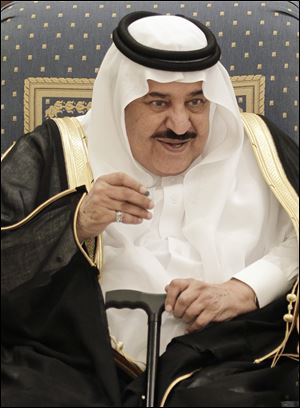
Saudis lose 2nd heir to throne in year's time
Crown Prince Nayef had led crackdown against al-Qaeda
6/17/2012
The death of Crown Prince Nayef opens the issue of succession in a crucial U.S. ally nation.
RIYADH, Saudi Arabia -- Crown Prince Nayef bin Abdul-Aziz, the hard-line interior minister who spearheaded Saudi Arabia's fierce crackdown against al-Qaeda's branch in the country after the 9/11 attacks and then rose to become next in line to the throne, died. Saturday. He was 78.
The cause of death was not disclosed, though he was reported to have had recent heart bypass surgery.
His death reopens the issue of succession in this crucial U.S. ally and oil powerhouse for the second time in less than a year.
The 88-year-old King Abdullah has now outlived two designated successors, despite ailments of his own.
His most likely successor as crown prince is Prince Salman, 77, who was governor of Riyadh from 1963 until November, when he became defense minister.
Like Crown Prince Nayef, Prince Salman is one of a group of brothers called the Sudeiri seven, all born to Hassa al-Sudeiri, a favorite wife of King Abdul Aziz al-Saud, who founded the kingdom in 1932.
Prince Salman is also believed to be ill.
The Saudi-funded pan-Arab TV station Al-Arabiya said Crown Prince Nayef died in a Geneva hospital.
He had a reputation for being a hard-liner and a conservative.
Crown Prince Nayef was believed to be closer than many of his brothers to the powerful Wahhabi religious establishment that gives legitimacy to the royal family, and he at times worked to give a freer hand to the religious police who enforce strict social rules.
His rise to crown prince in November, 2011, after the death of his brother Sultan had raised worries among liberals in the kingdom that, if he ever became king, he would halt or even roll back reforms that King Abdullah had enacted to bring more democracy to the country and increase women's rights.
Crown Prince Nayef said he saw no need for elections in the kingdom or for women to sit on the Shura Council, an unelected advisory body to the king that is the closest thing to a parliament.
Crown Prince Nayef, who was interior minister in charge of internal security forces since 1975, built up his power in the kingdom through his crackdown against al-Qaeda's branch in the country.
The Sept. 11, 2001, attacks in the United States at first strained ties between the two allies because for months the kingdom refused to acknowledge any of its citizens were involved.
Crown Prince Nayef became the first Saudi official to publicly confirm that 15 of the 19 hijackers were Saudis.